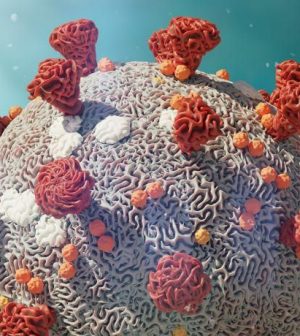- 10 Strategies to Overcome Insomnia
- Could Artificial Sweeteners Be Aging the Brain Faster?
- Techniques for Soothing Your Nervous System
- Does the Water in Your House Smell Funny? Here’s Why
- Can a Daily Dose of Apple Cider Vinegar Actually Aid Weight Loss?
- 6 Health Beverages That Can Actually Spike Your Blood Sugar
- Treatment Options for Social Anxiety Disorder
- Understanding the Connection Between Anxiety and Depression
- How Daily Prunes Can Influence Cholesterol and Inflammation
- When to Take B12 for Better Absorption and Energy
COVID Infection May Boost Antibodies for Up to 20 Months

If you’ve already had COVID-19, your natural antibodies may last as long as 20 months, a new study suggests.
While this is reassuring, experts are quick to caution that the new findings don’t necessarily mean you’re protected against reinfection, and that vaccines remain an important part of a COVID-19 prevention strategy.
“This study tells us that people have antibodies that hang around after COVID-19, but it doesn’t tell us anything about immunity as we don’t know what level of natural antibodies is needed for protection,” said Dr. Otto Yang. He is an immunologist at the University of California, Los Angeles, David Geffen School of Medicine who reviewed the findings. “People can and do get reinfected when they have natural COVID-19 antibodies.”
For the study, researchers measured levels of antibodies in the blood of 816 unvaccinated U.S. adults. The investigators found antibodies in 99% of those who said they had a positive COVID-19 test result; 55% of folks who believed they had COVID-19 but were never tested; and 11% who didn’t think they ever had COVID-19.
“Almost everyone with a documented COVID-19 infection had antibodies, and these antibodies seem to persist for quite a long time,” said study author Dr. Dorry Segev, a transplant surgeon at Johns Hopkins University, in Baltimore. “We really need to start incorporating antibodies from natural immunity into the context of immunity evaluation, moving from vaccine verification to immunity verification.”
Still, he cautioned, no level of antibody is a guarantee that you won’t get reinfected.
“There is certainly evidence that antibody levels correlate with … clinical protection, and the same caveats for natural immunity are there for vaccine immunity,” he said.
Segev’s findings were published online Feb. 3 in the Journal of the American Medical Association.
Other studies have shown that natural COVID-19 antibodies wane over time, often in about six months, Yang noted. The new study looked at data on a group of people at one point in time. Studies that follow the same people at several points in time have shown that natural antibodies do drop, Yang added.
Importantly, just because you have natural antibodies doesn’t mean you are protected against reinfection, stressed Dr. Len Horovitz, a pulmonologist at Lenox Hill Hospital in New York City.
“Antibodies can last in your blood for months, but we don’t know how much you need to be protected,” said Horovitz, who was not involved in the new study.
People who had more severe COVID-19 disease do have higher antibody levels but that doesn’t protect them forever, he noted.
“If you survived COVID-19, you have some cell-mediated immunity, but this is different from the type of immunity and antibodies you get from the vaccine, and it’s ideal to have both,” Horovitz said.
Antibodies to the nucleocapsid protein in SARS-CoV-2 only appear if you have recovered from COVID, he explained, while vaccines and natural infection produce an antibody to the virus’ spike proteins.
Do everything you can to protect yourself from COVID-19, he urged.
“Get vaccinated and boosted when you are able, wear masks in public places, practice social distancing, and stay home when you are sick,” Horovitz said.
More information
The U.S. National Library of Medicine has more on how the immune system works.
SOURCES: Otto Yang, MD, immunologist, David Geffen School of Medicine, University of California, Los Angeles; Dorry Segev, MD, PhD, transplant surgeon and professor, Johns Hopkins University, Baltimore; Len Horovitz, MD, pulmonologist, Lenox Hill Hospital, New York City; Journal of the American Medical Association, Feb. 3, 2022, online
Source: HealthDay
Copyright © 2026 HealthDay. All rights reserved.










